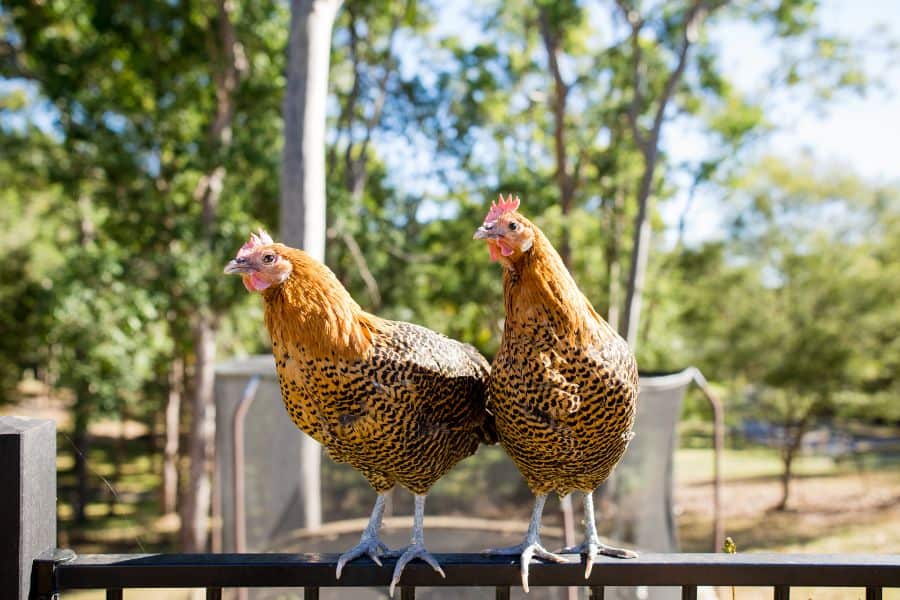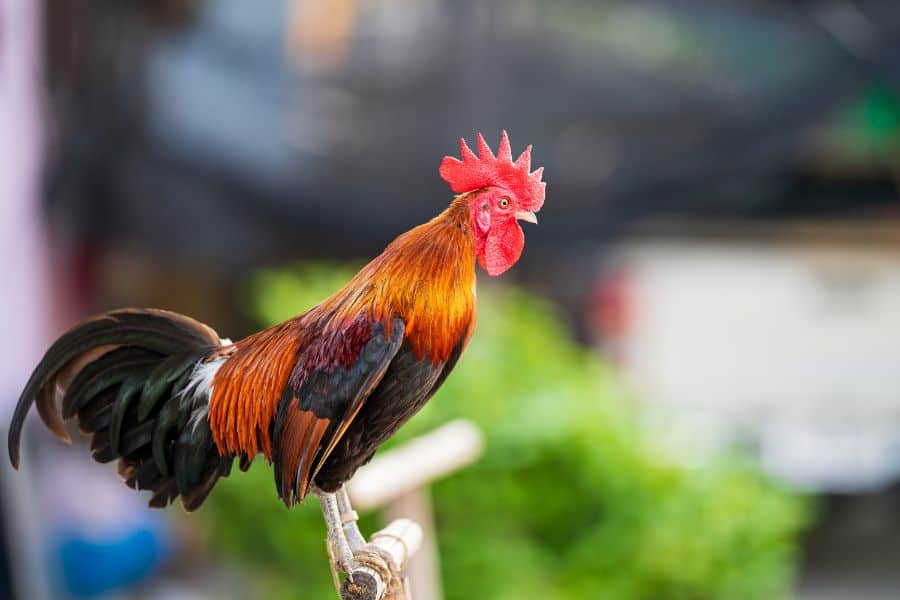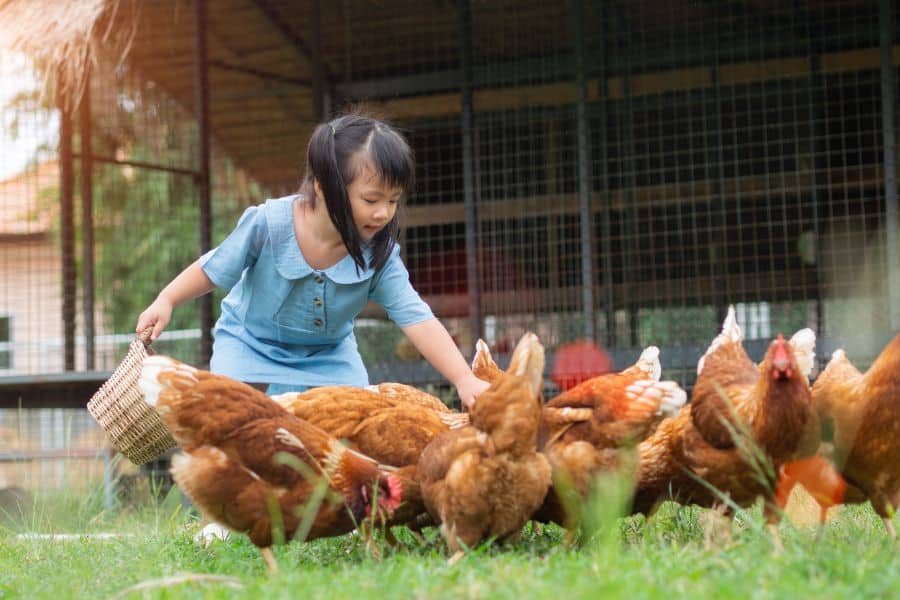Chickens are undoubtedly sweet farm animals for any backyard. They’re widely kept for meat and egg production, although some breeds are raised primarily for showing purposes.
But can they make good pet animals?
Well, if that’s the question bothering you, you’re not alone. In fact, whether chickens can be good pets is one of the most frequently asked questions by chicken fanciers and enthusiasts.
In this blog post, we will provide the lowdowns on whether your feathered companions can perfectly play the role of a pet.
8 Reasons Chickens Make Good Pets
Yes, chickens can make good pets, but some breeds are better at the role than others. Ideal pet chickens should be friendly and calm, as opposed to aggressive and aloof. With the right breed and the necessary knowledge of handling them, chickens can make wonderful pets.
Before you bring in a chicken as a pet, knowing whether the step you’re about to make is well worth it is essential. Let’s quickly examine why you chickens are good pets.
1. They Can Make Affectionate Companions
One of the chickens’ attributes that makes them great pets is their ability to become good companions. While this doesn’t apply to every chicken breed, some kinds develop a surprisingly affectionate bond with their human caregivers.
In fact, once trust is established, some breeds can go the extra mile to welcome their human companions back home with a hug, which is a really desirable trait commonly seen in canine pets.
A perfect example is the case recorded in the YouTube video below. You will notice how the chicken recognizes the owner from a distance and runs towards him for a cute hug!
2. Some Chickens Are Super Fancy
Who wouldn’t want a pet whose striking beauty leaves anyone who sees them in awe? I mean, we all love breathtaking looks, especially on pets, and chickens can be true beauty marvels!
Well, not all chicken breeds have this heightened level of beauty, but we’ve got a couple of them like the Polish and the Belgian d’Uccle, to mention but a few, that have been meticulously bred not for eggs, meat, or anything else — but purely beauty!
Most of these chickens come with rare traits like eye-catching crests, colorful plumage, and other standout attributes you’ll definitely appreciate and make you forget their egg-laying infirmities.
Plus, this charming beauty is often packaged with a genuinely sweet temperament, meaning you aren’t getting a mere pet but an adorable feathered friend whose companionship extends beyond the ordinary!
3. Chickens Are Low-Maintenance
Every pet needs proper care to stay happy and healthy, and chickens are no exception. However, these feathered beings don’t require as much care and attention as most traditional pets.
That’s because, unlike most other pets that fully depend on their owners for food, chickens are more independent, thanks to their inherent foraging instincts. This means you’ll incur much less on food, which is a plus if you are looking to spend as little money as possible on pet care.
Plus, unlike some pets, you don’t have to take your chickens out on a walk. Their foraging endeavors give them enough daily exercise, making them ideal for pet lovers whose schedules may not allow them to squeeze in some walk sessions.
4. They Offer Natural Pest Control
If you’re into gardening, you likely have dealt with pest infestation. And if so, you probably have had to invest in some commercial pesticide to eliminate the pesky critters.
Now, while some pesticides do the job perfectly, they’re never a safe way to get rid of pests, and that’s where the feathered companions come in.
As they go about their foraging activities in your garden, chickens feed on pests, which means you’ll end up with a happy bird and, at the same time, a healthy-looking garden free of pests.
5. Fresh Supply of Eggs
One of the standout benefits of chickens as pets is they provide a fresh supply of eggs. In fact, egg production is one of the leading reasons homeowners bring chickens into their backyard.
Chickens grant you the privilege to collect eggs from your backyard flock, and that’s really a satisfying experience of its own kind. Plus, you even enjoy fresh eggs whose nutritional value far surpasses that of the grocery-bought alternatives.
Usually, expect the eggs of your backyard flock to feature deep yellow yolks, which basically serve as a testament to their higher nutritional content.
And the best part — sometimes you’ll pick up the eggs while they’re still warm, which, honestly speaking, is one of the most rewarding aspects of being a chicken parent.
6. Chickens Impart A Sense of Responsibility
One of the essential roles of a parent is instilling positive values into the lives of the children. There are so many ways to go about it, and keeping a flock of chickens in your backyard is one of them.
Raising chickens in your backyard provides a perfect opportunity to train the little members of the family to grow into responsible individuals. Coaching them on caring for chickens and letting them witness the feathered companions return the favor through eggs helps them learn a valuable lesson on responsibility and its benefits.
Plus, since chickens grow more rapidly than children, seeing them grow from chicks to mature chickens acquaints them with information on the lifecycle of animals and connects them with the natural cycle of food production.
7. They Are a Good Source of Organic Fertilizer
Besides providing a natural way to control pests in your garden, chickens are also a good source of organic fertilizer. Their droppings are laden with a variety of nutrients, including nitrogen, which is essential for the healthy growth of plants.
However, before spreading these droppings onto your farm, it’s worth mentioning that poultry manure has a pH of about 6.5 to 8.0, which means it’s neutral to slightly alkaline. As such, not all plants are meant to work with chicken droppings or any other poultry manure.
A case in point is the ericaceous plants, which entails blueberries, camellias, tomatoes, cranberries, and others. These plants are considered “acid-loving”, meaning they work better with fertilizers that lean towards the acidic end of the pH scale.
8. Chickens Take Care of Kitchen Scraps
Have you ever prepared more food than you needed that you had to dispose of the leftovers in the trash?
It’s a common occurrence that happens to the best of us. But what most of us might not know is that disposing of food isn’t just a waste of resources — it can also adversely affect our environment.
The solution — pet chickens!
With pet chickens, you never have to be tormented with the guilt of tossing excess food in the trash. These birds will take good care of leftovers by converting them into healthy eggs and organic manure.
Doing this minimizes the amount of food waste going into landfills and, consequently, cuts down on the greenhouse gas emissions from food.
Potential Challenges of Keeping Chickens as Pets
While there are numerous perks of keeping chickens as pets, there are a few potential hurdles that you also need to be aware of before proceeding with the idea. Here are some of the downsides of keeping chickens as pets:
1. Chickens Can Be Hard to Train
One thing about dogs — and several other pets — is that they’re easy to train. But the same can’t be said of chickens.
Chicken training sometimes needs patience, something not all aspiring chicken owners have. But if you’re among the few that do have it and are willing to put in some extra bit of effort in training, successful chicken training is achievable, and some chicken enthusiasts even describe the process as fun.
2. Chickens Need Special Health Care
Chickens need specialized veterinarians for their healthcare needs. Unfortunately, finding poultry vets can be a hassle, and the scarcity of certified personnel makes the services more costly.
As such, before bringing in a pet chicken, try finding out if there’s a reliable poultry vet around you. It will save you future headaches.
3. Chickens Have A Relatively Short Lifespan
Once you establish the bond with your avian pet, you want to enjoy the companionship for as long as possible. Unfortunately, that isn’t typically the case, as chickens generally have a shorter lifespan than most pets.
Ideally, the lifespan of chicken ranges between 5 to 10 years, and sometimes it’s even shorter depending on the breed you get and, more importantly, the bird’s individual health.
4. High Risk of Zoonotic Diseases
While no pet is immune to occasional illness, chickens are particularly susceptible to zoonotic diseases. That includes illnesses like Salmonellosis, Avian influenza, Psittacosis, and other diseases.
All of these illnesses are highly contagious and can easily pass from one member of the flock to the other and, even more sad, their human caregivers. As such, always exercise a high level of caution when handling chickens.
For instance, remember to wash your hands with soap and water after handling your feathered friends. That’s just one of the ways to remain safe, and there are more biosecurity principles to follow, so ensure that you consult your vet on how to keep pet chickens safe.
5. Cleaning Chicken Poop Isn’t A Pleasant Experience
Let’s be honest — no matter how deeply you may love their feathered friends, cleaning their droppings is never fun. In fact, sometimes even getting closer to it can be a daunting challenge for some of us.
And unlike the traditional pets that can be trained to do their business at the appointed zones in your home, chickens will excrete anywhere in your home if free ranging — and they’ll do it at least 15 times a day unless they’re on their eggs.
As such, if you aren’t prepared to handle this smelly and unsightly mess in your home, think again before you get a pet chicken.
6. Noise And Potential Neighborhood Issues
Another aspect of chickens you must consider is their noise level. Chickens can be loud, especially if you have roosters! In fact, if you value the serenity of your space, chickens may not be a clever addition to your home.
The cock-a-doodle-doo serenades made by the roosters at dawn and throughout the day can be a real nuisance to you and the people around you. They could even lead to disputes with your neighbors, especially if you’re located too close to each other.
As for the females, they aren’t as loud, but their squawking and clucking are sometimes more than enough to stir up a conflict with your neighbors, especially if you locate the coop next to their property.
To mitigate the noise, keep the chicken house far from your neighbors and ensure that it’s well-insulated to minimize the noise. You may also want to work with relatively quiet breeds like Buff Orpingtons, Wyandottes, and other chickens considered to be generally quieter.
Related: Quiet Chicken Breeds
7. Potential Zoning & Space Limitations
Lastly, check whether keeping chickens as pets is allowed in your area. In some regions like Detroit, Michigan, chicken-keeping is strictly prohibited, while some states have regulations dictating the sex and number of chickens one can keep.
So, confirm if owning chickens could place you on the wrong side of the law.
If living in an apartment, confirm if chickens are allowed before buying them, even if local laws permit it. Pet-keeping rules vary from block to block, so see if it’s okay to have them around as per your block’s rules and regulations.
Of course, for apartment living, you must also ensure adequate space for the chickens. Go for chicken breeds that don’t mind confinement or limited space. Otherwise, you may end up with an unhealthy and unhappy chicken, which you definitely do not want.
Related:
Best Chicken Breeds For Pets
Good chicken pets have more to do with the bird’s individual personality than the breed. But we still can’t ignore that some breeds naturally have a more favorable personality for pets than others.
Some of the best chicken breeds for pets include:
- Serama
- Belgian d’Uccle
- Polish
- Rhode Island Reds
- Golden Campines
- Speckled Sussex
- Easter Eggers
- Jersey Giants
- Golden Laced Wyandottes
- Buff Orpingtons
- Partridge Silkies
All these chickens generally have at least most the characteristics a bird needs to have to make a good pet. But of course, as earlier said, individual variations within a breed still exist.
As such, despite the breed you choose, consider getting your chickens when they’re still young and train them for the role right from their chick stage.
And as you consider the personality, remember to also factor in other essential aspects like the chicken’s egg-laying capabilities, size, appearance, maintenance needs, common health issues, and other aspects.
For instance, for a pet chicken that can give you a good count of eggs, Rhode Island Reds, Easter Eggers, Speckled Sussex, Golden Laced Wyandottes, Seramas, or Buff Orpingtons are all good options. They are generally considered prolific layers, producing about 4 to 6 eggs per week on average.
Breeds like Belgian d’Uccle, Polish, Jersey Giants, and Partridge Silkies aren’t as proficient in egg-laying but make up for it through other standout qualities.
Let’s take the Belgian d’Uccle, for instance. Although they aren’t among prolific layers, they’re small, sweet-tempered, and fancy chickens, thanks to their mesmerizing feather colors.
All these attributes combine to make them excellent pets despite being unreliable layers. But then, you have to ensure they get enough room to roam because they so much love it.
Speaking of Polish chickens, they’re generally calm, friendly, and very docile creatures, making them excellent pets despite not falling under the category of renowned layers. But they tend to be more nervous and flighty than some other breeds, meaning they can easily enter your neighbors’ space when frightened.
As for the Jersey Giants, they have a massive build and are considered the largest chicken breed. That makes them an ideal option if you don’t value eggs as much as you do to have the grandest chicken breed.
Partridge Silkies, on the other hand, are small, super-cute, and come with five toes instead of the typical four, making them a clever pick if you value uniqueness and beauty over a high egg yield. But keep in mind that they need more maintenance than other breeds to keep their feathers dry.
In other words, we don’t have that one “perfect” chicken breed for pets. It’s all about what you’d want more in your pet chicken and what you wouldn’t mind losing to get what really matters to you. As long as you have your priorities well-defined, you can easily get a good chicken for your petting needs.
Chicken Breeds to Avoid As Pets
When choosing pet chickens, not every breed is perfect for you. Some chickens have attributes that don’t align with the qualities of a good pet. As such, it’s essential to avoid such breeds, especially roosters.
Some of these chicken kinds include:
- Old English Game
- Malay
- Sumatra
- Phoenix
- Malay
- Cornish
- Shamo
- Aseel
- Oriental Game
These chicken breeds are generally considered aggressive, and that’s to say they’re not typically well-suited for the pet role. Some were even bred for fighting, making it even instinctually harder to serve as pets.
Roosters Versus Hens — What Makes A Better Pet Chicken?
Male and female chickens can all make great pets. It all depends on what you want in your feathered pet. If you need an egg-producing pet or one that’s less noisy, female chickens should be your go-to options. The same applies to a pet chicken that can associate well with children.
However, if you value fanciness over serenity and egg production, go with roosters. Usually, roosters come with a more striking appearance than the hen versions and are generally cuter compared to the female chickens of the same breed.
But then, remember that cockerels are usually more inclined to be aggressive than females of the same breed. As such, they may not make the best companions if you want a pet that can get along perfectly with your little one.
5 Ways to Keep Your Pet Chickens Happy
As a pet parent, you want to ensure your pet chicken gets the most wonderful life under your watch. Here are some key tips on keeping chickens healthy and happy as pets.
1. Give Them a Proper Diet
While most chickens will forage for their food, you still have to ensure they get a well-rounded diet at the end of the day. The ideal diet depends on several factors, including the bird’s use, age, and health status.
Generally, growing chickens need at least 20% of their daily intake to constitute protein. This nutrient helps them build tissues. As for the layers, ensure that you offer calcium supplements to enhance the quality of the eggs.
2. Don’t Skimp on Health Care
A healthy pet is a happy pet. Remember to take your avian pet for basic health checks occasionally. Ensure they get all the necessary vaccines to minimize the chances of falling sick. Also, consult your vet whenever you notice your chickens exhibiting unusual signs.
3. Give Them Proper Housing
Besides a balanced diet, ensure your feathered pets get a nice coop. It should be designed to meet all the birds’ individual needs, well-ventilated, and large enough to give birds enough space to roam around.
As for the size, stick to the general rule of at least 4 square feet for every chicken. Also, design the coop to keep predators like raccoons at bay. And yes, regularly clean it to prevent the spread of disease.
4. Create Time for Your Pets
Every friendship requires some level of commitment. Create time every day to spend with your feathered friends. It will help them build trust in you and let you know more about their personalities.
Some breeds including the Polish chickens so much love attention that it’s too difficult to make them happy without it. They love to spend most of their time with owners who talk to them frequently, but that generally reflects what almost every other pet chickens expect from their owners.
5. Keep them Groomed
Most chickens self-groom using dust baths and scratching on the surface. But not all chickens do this. Plus, some chickens may need better grooming, especially if you have an ornamental breed and would want to keep it’s striking appearance in tip-top condition.
As such, occasionally groom your chickens to keep their health in the best condition possible. You can always work with a vet or have them train you if you don’t know the correct way to do it.
Read More:
Conclusion
Chickens can make good pets if you get the right breed and know the tips and tricks for keeping them happy and healthy. In fact, chickens go beyond being mere companions to offer eggs, help in pest control, and provide nitrogen-rich organic fertilizer.
But then, before you bring them in as pets, get to know the downsides involved. That way, you can evaluate and know whether the step you’re about to take is well worth it.



